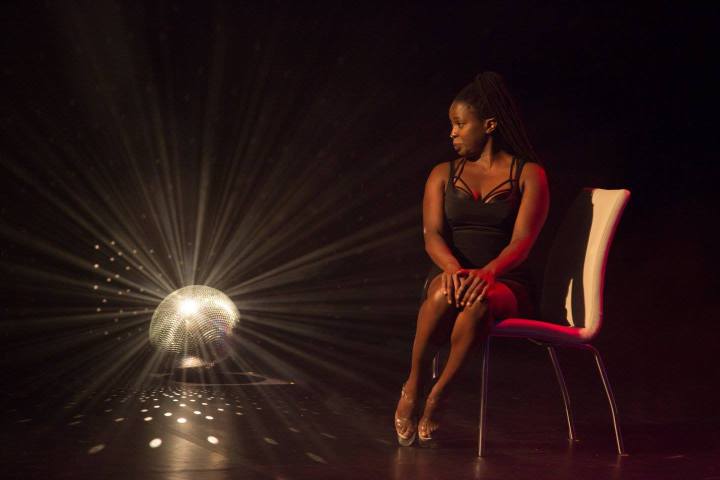
The Lowry, Salford.
27 October 2017.
In ‘Superposition’ Chanje Kunda embarks on a voyage of self-discovery through scientific theory, lap dancing and personal reflection. Pondering her place in the universe, the laws of attraction and even her identity as a woman Kunda seeks insights from a particle physicist, a professor of philosophy and her son. She also takes lessons in erotic dancing and attends a body confidence workshop. The discoveries she makes through this process and the thoughts they provoke form the basis of the show.
What strikes you most strongly is Kunda’s love of language and knowledge. Great care has gone in to the choice of words and the ideas they express. She slowly caresses each word, making sure everything is heard and has value. As she blends scientific concepts with rich vivid imagery we can feel her wonder, her gaze spanning wide across galaxies or focusing in on cellular detail.
There is something almost sensual in the descriptions of scientific thought which contrasts sharply with the ridicule Kunda heaps on the crude techniques and rituals she encounters in erotic dance. Sharing her lessons in lap dancing, she totters precariously on a pair of towering perspex heels. When she leaps forward like a “pouncing panther” to supposedly drive us wild with desire, she hits the deck like a sack of potatoes. Her demonstration of ‘floor fuckery’ is a knowing dismissive parody. It’s also very funny.
Throughout, the show’s choreography is as thoughtful and lucid as its use of language. At times Kunda communicates using a seamless mixture of both – her hands swirl to create the cosmic entity she describes or they jerk rhythmically as she recounts difficult feelings.
While some of her research findings provide general food for thought, a few of the experiences she shares with us, feel so much more personal. As she strips off in the company of other woman at a body confidence workshop, her fascination mingles with feelings of real vulnerability. There is also a sense that her investigations have been partially sparked by hurtful experiences. Was she perhaps working through her anger and confusion at being abandoned by her partner? She also lets us hear her son’s frustration at her choice of a poorly paid artistic career and his inability to understand her strong need to be in control of her life. These feel like genuinely brave choices to include and bring added emotional depth to the piece.
Kunda’s willingness to expose her sometimes raw feelings can be felt most strongly in an extended sequence reflecting on loneliness. “Sometimes I’m as lonely as a snow-capped mountain” she confesses, sinking in to a chair and gradually losing herself in the moment. As if oblivious to us, she appropriates the erotic movements she had earlier mocked so mercilessly. Dancing not to attract some man but only for herself – she gently extends her limbs as if reaching for her furthest limits. She settles in to her body and seems to become at one with it. Pointing her legs skywards, those ridiculous perspex shoes catch the light, and she watches as they sparkle like diamonds. She moves her feet as if fascinated by how the shoes reflect and distribute the beams of light. It’s a wonderfully intense section, full of subtle feeling.
Kunda also reflects on her experience as a black woman. She remembers noticing the differences between her body and those of the white women at the body confidence workshop and being struck by the absence of a black woman on stage at the lap dancing club. There are also more abstract references to black history and identity. At one point she symbolically loosens the tightly bound ropes that criss cross the back of her jacket. Later she mentions how her tears taste of the Atlantic. When celebrating the beauty of her body, Kunda’s descriptions of her relationship with it become increasingly more powerful, culminating in her proclamation “I own my black body”.
Science proves to be a useful lens to consider daily life through. Using the techniques of scientific enquiry, Kunda identifies problems and looks for patterns in them. She considers them from various angles to help break free from restricting cycles of behaviour or emerge from emotional black holes. She also examines her identity with the cool clinical precision of a microscope – breaking herself down to multiple facets, isolating and experimenting with the various elements of her personality.
‘Superposition‘ is ingeniously kaleidoscopic and Chanje Kunda pulls it all together with a magnetic, layered performance. Uplifting and liberating, it emphasises the endless possibilities that exist not only within the universe but within each of us.
Photo Credit: Sam Ryley
Reblogged this on msamba.
LikeLike
You have really captured this complex and elusive show – fab!
LikeLiked by 1 person